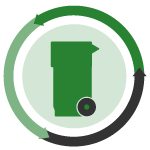 The Constitution State offers up a plan to cut waste, and a city in Iowa is getting rid of curbside glass collection.
The Constitution State offers up a plan to cut waste, and a city in Iowa is getting rid of curbside glass collection.
UBC price fluctuations: Modest seasonality affects the value of used aluminum beverage cans. Resource Recycling’s market charts show that UBC prices generally fare better in the first and third quarters of the year. About 60 percent of the time, prices fall in July, and the chance prices will rise in September is 80 percent.
Waste reduction plan: The state of Connecticut has announced a plan to reduce waste. The New Haven Register says the state wants to cut waste by 60 percent by the year 2024.
Aluminum scrap in cars: A new report from the Worcester Polytechnics Institute’s Center for Resource Recovery and Recycling shows a high recycling rate of aluminum from scrapped cars. The study shows the rate at 91 percent.
Glass leaves the curb: Sioux City, Iowa has decided to no longer accept glass curbside, instead setting up drop-off sites around the city. According to the Sioux City Journal, the City made the decision after its MRF announced it would no longer accept glass. Continuing curbside collection and transporting the glass to a different MRF would have added 60 cents to residents’ monthly bills.
Best and worst of B.C.: Campbell River, British Columbia, a city on the eastern coast of Vancouver Island, is receiving praise for its low contamination rate. According to data from its local MRF, the amount of unacceptable material in its single-stream recycling is 3.9 percent. Meanwhile, the City of Duncan, on the southern part of the island, is facing fines and penalties for its high contamination rate. The Cowichan Valley Citizen reports the City has a contamination rate of around 15 percent.
Redemption center ripples: More than 300 California redemption centers have closed in the past year, which, according to KPCC, is leaving a mark on the state’s homeless population. Many of them earn money by recycling bottles and cans and are now finding that difficult.

